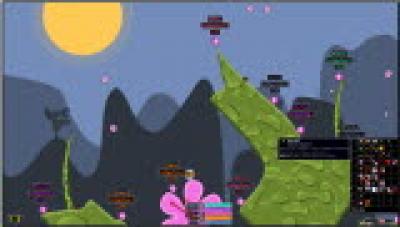[dropcap style=”font-size:100px; color:#992211;”]C[/dropcap]omputer games. Proudly making your mates into droning identikit borefests since Pacman got married.
And then tweeting about it.
It’s well known that people who communicate face-to-face will start to imitate each other. People adopt each other’s poses and gestures, much like infectious yawning. What is less known is that the very physiology of interacting people shows a type of mimicry – which we call synchrony or linkage, explains Michiel Sovijärvi-Spapé.
Hedgehogs
In the study, test participants play a computer game called Hedgewars, in which they manage their own team of animated hedgehogs and in turns shoot the opposing team with ballistic artillery. The goal is to destroy the opposing team’s hedgehogs. The research team varied the amount of competitiveness in the gaming situation: players teamed up against the computer and they were also pinned directly against each other.
The players were measured for facial muscle reactions with facial electromyography, or fEMG, and their brainwaves were measured with electroencephalography, EEG.
Brainwaves
Replicating previous studies, we found linkage in the fEMG: two players showed both similar emotions and similar brainwaves at similar times. We further observed a linkage also in the brainwaves with EEG, tells Sovijärvi-Spapé. [quote]the linkage may enable
one to better anticipate
the actions of opponents[/quote]
A striking discovery indicates further that the more competitive the gaming gets, the more in sync are the emotional responses of the players. The test subjects were to report emotions themselves, and negative emotions were associated with the linkage effect.
Although counterintuitive, the discovered effect increases as a game becomes more competitive. And the more competitive it gets, the more the players’ positive emotions begin to reflect each other. All the while their experiences of negative emotions increase.
The results present promising upshots for further study.
Feeling others’ emotions could be particularly beneficial in competitive settings: the linkage may enable one to better anticipate the actions of opponents.
Another interpretation suggested by the group is that the physical linkage of emotion may work to compensate a possibly faltering social bond while competing in a gaming setting.
Since our participants were all friends before the game, we can speculate that the linkage is most prominent when a friendship is ‘threatened’ while competing against each other, ponders Sovijärvi-Spapé.
Source: Aalto UniversityHedgewars screengrab: Aalto University

Some of the news that we find inspiring, diverting, wrong or so very right.



















